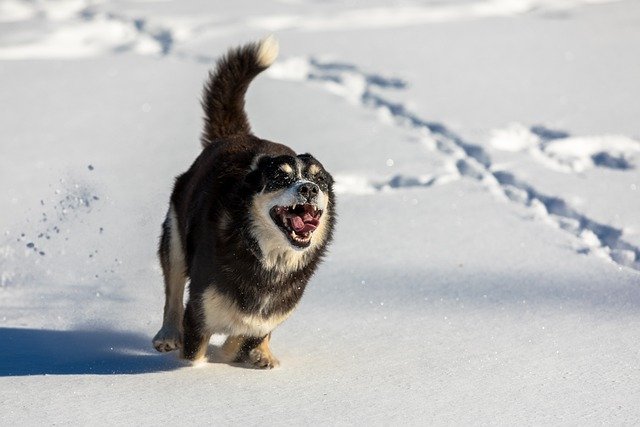Winter Pet Care: Keeping Your Furry Friend Safe and Cozy
- by Sarai Da Silva
-

Winter Pet Care: Keeping Your Furry Friend Safe and Cozy
As winter arrives with its chilly embrace, it's not just us humans who feel the shivers – our beloved furry friends do too. While we curl up under blankets, sip hot cocoa, and watch the snowfall, our pets need special care to stay safe and warm. In this comprehensive guide, we'll embark on a journey through the winter wonderland of pet care, equipping you with the knowledge and tools to keep your dog snug and comfortable. So, grab a warm blanket, a cup of tea, and let's dive into the world of winter pet safety tips.
Understanding Winter Skin Woes
When Winter Bites: Dog Skin Rash and Itchy Skin
In the frosty depths of winter, dogs can experience a condition known as the "winter itch." Just as we suffer from dry skin in the cold, our four-legged friends can develop a bothersome skin rash. Their skin may become dry, flaky, and prone to itching and redness.
Common Winter Skin Problems for Your Pup: Winter's chill can lead to a variety of skin problems for dogs. Some common issues include irritated skin and flaky skin.
Consult Your Veterinarian Immediately: If you notice your dog developing bald patches, skin lesions, or other unusual skin conditions, it's essential to consult your veterinarian immediately. These could be symptoms of an underlying illness or skin infection.
Tackling Dry Skin with Natural Remedies
When it comes to dry skin in dogs, it's essential to choose safe and natural remedies that provide relief without harmful side effects. Here are some remedies to combat that pesky winter dryness:
-
Home Remedies: Consider soothing oatmeal baths, the healing power of coconut oil, and adding Omega-3 fatty acids to your dog's diet.
-
Puppy Skin, Pup-Specific Remedy: Puppies require a gentle touch. Opt for moisturizers specifically formulated for puppies or explore the benefits of coconut oil for their tender skin.
-
Preventing Cold Weather Dangers: A well-maintained dog coat helps keep your pet warm and prevents cold weather dangers. Regular brushing and grooming can also help prevent dryness and keep your dog's coat in top condition.
Choosing the Right Winter Accessories for Your Pooch
Cozy Coats and Stylish Sweaters
Just as we bundle up in warm winter clothes, our dogs may need extra layers to stay cozy and comfortable in the cold. Coats and sweaters are not just about style but about warmth and protection. Breeds with shorter fur or those unaccustomed to frigid temperatures benefit from the extra insulation.
Protecting Pet's Paws from Cold and Salt with Dog Boots
Imagine walking barefoot on icy sidewalks or salt-covered roads – it's not a pleasant thought. Your dog's paws are just as sensitive. Dog boots offer practical protection, especially for breeds prone to cold-induced discomfort or those with delicate paw pads.
Stylish and Functional Dog Hats
Dog hats aren't just a fashion statement; they serve a practical purpose. In winter, a hat helps retain your dog's body heat, especially for breeds with exposed ears or those more susceptible to cold-induced discomfort.
Cozy Blankets and Comfy Bedding
Indoors, ensure your dog has a warm and cozy spot to rest. Blankets and bedding serve a dual purpose – they keep your dog warm and provide comfort. Position your dog's bed away from drafts to prevent discomfort and reduce the risk of skin problems.
Grooming: The Power of Pampering
Don't underestimate the power of grooming during the winter. Regular brushing helps distribute your dog's natural oils, keeping their coat and skin in top condition. It also removes dead skin cells and stimulates blood flow to the skin. A well-groomed coat acts as an effective barrier against the cold.
Outdoor Safety Tips for Winter Pet Care
Limit Outdoor Time in Extreme Cold
Just as it's essential to protect your dog from the cold, it's equally important to limit their exposure to extreme cold. Prolonged exposure to frigid temperatures can lead to discomfort and, in severe cases, frostbite or hypothermia.
Winter Dog Walks: Timing Matters
The timing of your dog's winter walks can make all the difference. Aim for outings during the warmest part of the day, usually late morning or early afternoon. This minimizes the risk of exposing your dog to the coldest temperatures.
Watch for Signs of Discomfort
Pay close attention to your dog's behavior during outdoor activities. If they start shivering, whining, or lifting their paws off the ground, it's time to head indoors. These are clear signs of discomfort in the cold.
Protecting Your Pet's Feet and Preventing Chemical Exposure
After every outdoor adventure, make it a habit to clean and dry your dog's paws thoroughly. Salt, de-icing chemicals, and snow can cause irritation and discomfort to your dog's paw pads. Consider using pet-safe products to prevent cold weather dangers.
Keep Pets Warm and Consult Your Veterinarian
It's not just dogs; cats can also be affected by the cold. It's crucial to keep your pets warm and ensure they have access to cozy shelter. Winter can be especially tough on outdoor cats. Make sure they have a warm, dry place to seek refuge.
Should you notice your pet licks excessively, especially around their paws or dog's head, it could be a sign of discomfort or skin issues. Monitor your pet's coat for any signs of hair loss, bald patches, or flaking skin. These can be indicators of skin problems or even allergic reactions. If any of these symptoms persist, don't hesitate to consult your veterinarian. They can provide guidance on how to address skin issues and keep your pets healthy throughout the winter.
Winter Wellness for Your Furry Friend
Mastering winter pet care is all about understanding the unique challenges your dog faces during the cold season and taking proactive steps to ensure their safety and well-being. By addressing common winter skin issues, choosing the right winter dog accessories, and following outdoor safety tips, you can provide your furry friend with a warm and comfortable winter.
As devoted pet owners, it's our responsibility to keep our pets healthy and happy, especially during the challenging winter months. To ensure your furry companions thrive in the cold, make sure to provide them with the right food and water, as proper nutrition and hydration are key to maintaining their well-being. While these loving creatures can't articulate their needs, their health depends on us. Remember, just as we wrap ourselves in warm blankets and coats, we must also prioritize keeping our pets warm. And should you notice any signs of discomfort or skin issues, don't hesitate to consult your veterinarian. Together, we can make this winter a cozy and joyful season for our pets.
Remember, just as we need to adapt to the changing seasons, our dogs rely on us to keep them safe and healthy. So, whether you're strolling through a snow-covered park or cozying up at home, enjoy the season with your furry companion by your side.
FAQs
1. What are some common skin problems that dogs can experience during winter, and how can I identify them?
During winter, dogs can develop skin problems such as dryness, flakiness, itching, and rashes. You can identify these issues by observing changes in your dog's skin, including redness, bald patches, skin lesions, or unusual conditions. If you notice any of these symptoms, it's essential to your pet's health to consult your veterinarian.
2. What are some natural remedies to combat dry skin in dogs during the winter months?
Natural remedies to combat dry skin in dogs include soothing oatmeal baths, using coconut oil, and incorporating Omega-3 fatty acids into your dog's diet. It's important to choose remedies that are safe and effective for your pet.
3. How can I choose the right winter accessories for my dog to keep them warm and comfortable?
Selecting the right winter accessories for your dog involves choosing cozy coats, stylish sweaters, protective dog boots, and functional dog hats. The choice of accessories depends on your dog's breed, their sensitivity to cold, and their specific needs.
4. What are some outdoor safety tips to ensure my dog's well-being during the winter season?
Outdoor safety tips include limiting your dog's exposure to extreme cold, timing winter walks during the warmest part of the day, and paying attention to signs of discomfort, such as shivering or lifting paws off the ground. Additionally, it's crucial to protect your pet's paws from salt and de-icing chemicals.
5. How can I provide winter wellness for my furry friend and keep them healthy during the cold season?
Winter wellness for your pet, dogs and cats, involves understanding the unique challenges they face during winter and taking proactive steps to ensure their safety and well-being. This includes addressing common skin issues, selecting appropriate winter accessories, and following outdoor safety guidelines. Proper nutrition and hydration are also key to maintaining your pet's well-being during the winter months.






